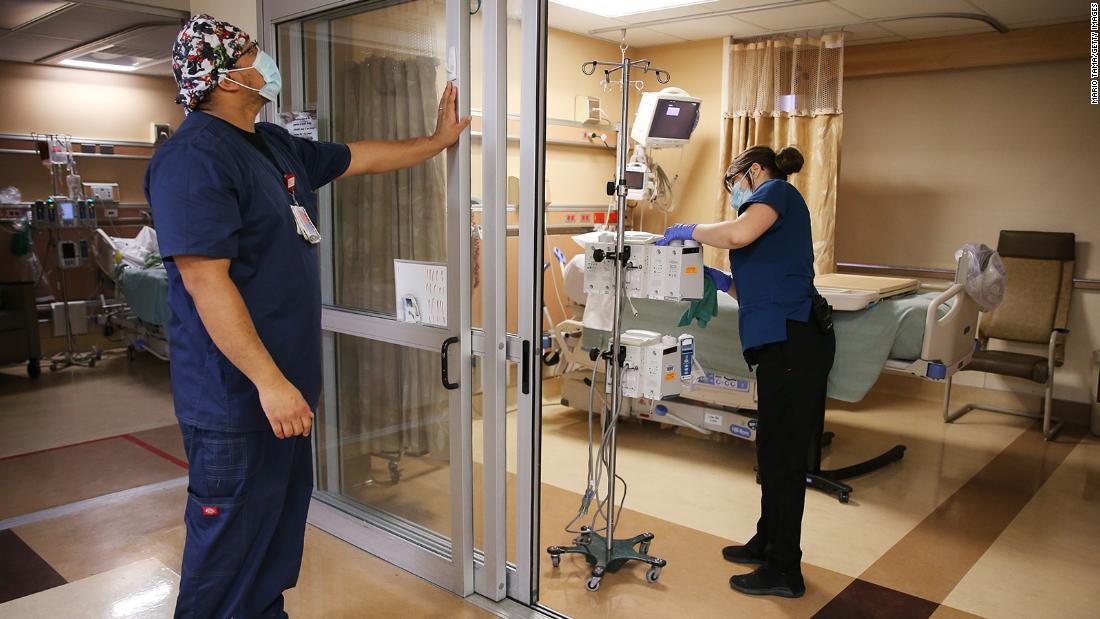Would covid-19 affect the brain?
Study indicates yes 2:30
(CNN) -
Dr. Michael Saag normally cares for covid-19 patients, but early in the pandemic he became one.
Now, he has joined the ranks with lingering symptoms of a disease that doctors are still trying to understand.
In Saag's case, Covid-19 was never severe enough to require hospitalization, but he spent 15 days isolated in his room, and it got better… mostly.
His difficulty concentrating, or "brain fog," persisted.
He was out of breath easily.
His heart was racing.
These symptoms lasted for six weeks after infection.
Saag felt well enough to go back to work at the University of Alabama Birmingham, but even after the other symptoms subsided, he experienced hearing loss and now wears hearing aids.
"It's frustrating," he said Thursday at a meeting of the US Centers for Disease Control and Prevention's (CDC) Clinical Outreach and Communication Activity.
advertising
Saag said he has met other patients with persistent symptoms who are also frustrated.
Most severe COVID-19 cases had long-term symptoms, study finds
"They have gone to their doctors, who have told them that this is in their head or that they do not have to worry about it, but that it has touched them very deeply," Saag said.
There is no established name for this: these people are sometimes called 'long haulers' or 'long-lasting', or they are said to experience so-called 'long covid', or post-covid symptoms, or even post-covid syndrome.
There is also no diagnostic test, no specific treatment, no pill to take.
And while research is ongoing, there are still no large peer-reviewed, standard-referenced clinical trials.
Some people get better on their own over time, or symptoms can be treated, but for others, recovery is still difficult.
This week, the American Medical Association adopted a policy to educate doctors and students about post-viral syndromes after COVID-19.
Also this week, the CDC released interim guidance intended to help clinicians better assess patients with post-COVID-19 conditions, even with so much uncertainty around them.
100 symptoms and little consistency
Postcovid is an umbrella term that describes a series of physical and mental problems that can appear four or more weeks after a COVID-19 infection, according to the CDC.
There are potentially hundreds of symptoms, such as shortness of breath, fatigue, headache, fever, anxiety, depression, pain, loss of taste and smell, trouble thinking, racing heart, and many others.
The symptoms are not constant.
Doctors cannot predict who or what symptoms someone will have, and symptoms can change over time, or go away and then come back.
Sometimes the solution seems relatively straightforward.
Dr. Mitchell Miglis, an autonomic disorders specialist who works with postcovid patients at Stanford Health Care, said there are cases where he reminds people to watch their salt intake, or to increase fluids, or to prescribe a beta blocker, and finally they get better.
"First we try to control the symptoms and then we use it as a bridge for them to be more physically active and then we treat all the components that we can," Miglis said.
But not all symptoms are so easy to treat.
"We don't really have a single treatment that addresses the underlying disease, because we don't yet know what causes the underlying disease," Miglis said.
Long-term Covid: "There are patients who feel they never recovered from the coronavirus"
Millions of people could be affected
It is also not entirely clear how many people have it.
In April, Dr. Frances Collins, director of the National Institutes of Health (NIH), told Congress that preliminary research had revealed that between 10% and 30% of people who infected with covid-19 could develop long-term health problems.
A FAIR Health study published Tuesday examined the private insurance records of nearly 2 million covid-19 patients and concluded that nearly a quarter, 23.2%, had at least one post-virus condition 30 or more days after initial diagnosis.
With more than 33 million COVID-19 cases accounted for in the United States since the start of the pandemic, there could be millions of people with persistent symptoms.
"It's probably an understatement," says Leonard Jason, a psychology professor who works on "brain fog" with post-covid patients at DePaul University in Chicago.
He wants doctors to be vigilant about these patients so that they receive the proper care.
Why do many people report a "mental fog" after suffering from Covid?
“There are probably many people who have contracted this and have not been identified.
That is a question, how can we establish the criteria of what it means to be a long-term patient? "
Jason said.
"There is not much consensus at the moment, which is a problem."
Who are the long-term affected?
The FAIR Health study, which examined insurer records between February and December 2020, found that post-COVID-19 conditions were more common among the most severe patients, but a 'substantial' portion of asymptomatic cases also had long-term symptoms.
More research is needed, he said.
Most of the postcovid conditions studied were more common in women, but there were 12 more common symptoms in men.
“I have been surprised by how many people do not have any underlying health conditions, in fact a couple of marathon runners who are young in their 20s and 30s.
They come back with post-covid conditions that sometimes have a hard time just standing in the shower, ”Saag said of some of the patients he has treated.
What is being done
In February, the NIH launched an initiative to identify the cause, prevention, and treatments of the postcovid condition.
In December, Congress provided $ 1.15 billion in funding over four years to support NIH research.
The American Medical Association's policies adopted this week also called for advocating for increased funding for research, prevention, monitoring and treatment.
For now, a person experiencing prolonged covid symptoms can receive care from their regular doctor, or from one of the post-covid care clinics that have opened across the country.
During a call with doctors this week, the CDC said that most conditions can be identified and treated by a person's primary care doctor, in coordination with specialists and such clinics.
Postcovid clinics register signs of hope
New York's Mount Sinai Post Covid Care Center, one of the first clinics of its kind to open, has been very busy.
By February, doctors had already registered 1,600 patients.
These days, David Purtino, a physical therapist who helps patients at the clinic, feels a new sense of hope.
"When I spoke to the media three months ago, I said that everyone is improving, and we are encouraged by their improvement, but there is not a single person who has overcome the covid," says Purtino.
“Now, after months and months of working and perfecting this, we have dozens of individuals that we have now discharged telling us that they feel like they did before they had COVID-19.
This is a novelty.
For many patients it has not been easy.
On average, he said, it's 100 days of therapy.
"It's a long, very slow process, very incremental therapy, twice a week, and people have to make a lot of behavior and life adjustments along the way to avoid symptom triggers and exacerbations," he said. Purtino.
"But we feel quite encouraged because we are finally getting some momentum."
Not everyone takes that long to heal.
Dr. Panagis Galiatsatos, a critical care and pulmonary medicine physician who treats patients at the Johns Hopkins Post Covid-19 Care Clinic, indicated that some people get better in about three months.
I tell them it's like breaking a bone.
If we remove the cast, he's not going to be ready to run right away.
It has to be rehabilitated, and it will be uncomfortable, but it will get better, ”says Galiatsatos.
Another category of patients develop treatable symptoms that are more specific to the lungs, such as asthma.
"Everything from the brain to the feet can be affected," said Galiatsatos.
Some people also need mental health care.
"The last category of patients we registered has symptoms that do not fit a specific disease process that we know about," Galiatsatos said.
He tells them that they will figure it out together.
One patient he treated compared it to the way good doctors treated AIDS in the 1980s.
"Sometimes we have to think a little beyond the ordinary about the best way to help," said Galiatsatos.
But I trust we can do it.
Covid-19








/cloudfront-eu-central-1.images.arcpublishing.com/prisa/PLLMQZDHVVEMHBHGHSS4ZY4A2E.jpg)






